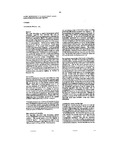Further developments of a neural network speech fundamental period estimation algorithm
| dc.contributor.author | Howard, Ian | |
| dc.date.accessioned | 2019-10-22T12:48:29Z | |
| dc.date.available | 2019-10-22T12:48:29Z | |
| dc.date.issued | 1991-12-01 | |
| dc.identifier.issn | 0537-9989 | |
| dc.identifier.uri | http://hdl.handle.net/10026.1/15035 | |
| dc.description.abstract |
This work describes a speech fundamental period estimation algorithm that estimates the time of excitation of the vocal tract using a pattern classifier, the multi-layer perceptron (MLP). The pattern classifier was trained using speech semi-automatically labelled by means of an algorithm that makes use of the output from a Laryngograph. Various issues arising in the training of the system were explored. Three basic configurations of the system were compared using different pre-processing strategies. It was found that processing the sampled speech time - waveform directly with the pattern classifier gave better results than using one of two filterbanks. The performance of the algorithm was evaluated against that of a simple peak-picking algorithm and the well known cepstrum algorithm using quantitative frequency contour comparisons. The performance of the new algorithm on a difficult set of test data was shown to be better than the peak-picker and comparable to the cepstrum algorithm. The advantage of the scheme is that fundamental period estimates are made on a period-by-period basis, thus preserving the irregularity in the speech excitation that is lost by techniques that produce as average period estimate. In addition, its simple structure lends itself to real-time implementation (Howard & Walliker, 9; Walliker & Howard, 14). | |
| dc.format.extent | 340-344 | |
| dc.language.iso | en | |
| dc.title | Further developments of a neural network speech fundamental period estimation algorithm | |
| dc.type | conference | |
| dc.type | Conference Proceeding | |
| plymouth.issue | 349 | |
| plymouth.publication-status | Published | |
| plymouth.journal | IEE Conference Publication | |
| plymouth.organisational-group | /Plymouth | |
| plymouth.organisational-group | /Plymouth/Faculty of Science and Engineering | |
| plymouth.organisational-group | /Plymouth/REF 2021 Researchers by UoA | |
| plymouth.organisational-group | /Plymouth/REF 2021 Researchers by UoA/UoA11 Computer Science and Informatics | |
| plymouth.organisational-group | /Plymouth/Users by role | |
| plymouth.organisational-group | /Plymouth/Users by role/Academics | |
| dc.rights.embargoperiod | Not known | |
| rioxxterms.licenseref.uri | http://www.rioxx.net/licenses/all-rights-reserved | |
| rioxxterms.type | Conference Paper/Proceeding/Abstract |


